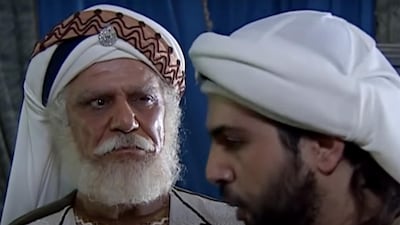Ramadan television is often all about the next big thing.
Each year brings hundreds of hours of new dramas featuring the latest crop of stars.
With so much content coming our way, viewers, naturally, only sample a fraction of what is on offer. Hence the repeat of programmes throughout the year until another batch of shows are released the next holy month.
With such a focus on the here and now, classic and forgotten dramas often fall by the wayside.
However, the growing popularity of streaming sites has given many much-loved series – particularly from the 1980s to early 2000s – a fresh lease of life, and has enchanted new generations of audiences with timeless and thrilling tales spanning societal, political, religious, urban and rural concerns.
Best of all, you don’t have to dig too deep into the online rabbit hole to find these gems.
Many titles are readily accessible online on the likes of YouTube and MBC’s Shahid.
From Egyptian thriller Raafat Al Haggan to Syria's Al Fousoul Al Arba'a, roll back the years this Ramadan with these classic offerings available online.
1. ‘Raafat Al Haggan’ (YouTube)
Running for three seasons from 1988, Raafat Al Haggan was the Game of Thrones of its time.
Based on the true story of the titular character (played with panache by Mahmoud Abdel Aziz), an Egyptian man spends 17 years engaged in clandestine operations in Israel.
The programme, written by Egyptian novelist Saleh Morsi, was rich and thoughtful with Egyptian and Israeli characters full of moral complexities rare for its time.
2. ‘Zeinab Wal Arsh’ (YouTube)
Starring Mahmoud Morsi and Soheir Ramzy, and set in the offices of a struggling Cairo newspaper, this tale of love, deceit and political intrigue, released in 1980, has the seasoned lead couple playing characters 10 years their juniors.
However, they are such pros that you can forgive the discrepancy.
3. ‘Saqr Quraish’ (MBC Shahid and YouTube)
Directed by the late and influential Syrian filmmaker Hatem Ali, this 2002 landmark and lavish drama traces the rise and fall of the seventh and eighth century Umayyad dynasty.
The series set a new benchmark for Arabic drama in terms of its production values and action sequences, as well as with its premier Syrian ensemble cast, including Sulaf Fawakherji, Khaled Taja, Bassem Yakhour, Jamal Sulaiman and Taim Hassan.
4. ‘Omar Ibn Abdel Aziz’ (YouTube)
Starring Nour El Sherif, the 1994 series centres on Omar II's brief but influential reign as the leader of the Umayyad Caliphate from 717-720 AD.
El Sherif gave a commanding performance as he delivered his lines in the classical Arabic dialect of Fusha, making the programme as entertaining as it was educational.
5. ‘Al Fousoul Al Arba’a’ (YouTube)
Another classic Syrian series directed by the late Hatem Ali, Al Fousoul Al Arba'a debuted in 1999 (with a second part released in 2002) and follows the lives of a number of Damascene families and how their relationships are defined by cultural and societal barriers.
The series was acclaimed for its authentic portrayal of urban Syrian life at the time.
6. ‘A’ilat El Hajj Metwalli' (YouTube)
A classic Egyptian comedy series, this show has seemingly continued to run each year across various regional channels since its debut in 2001.
While the plot may sound flimsy – a successful businessman (Nour El Sherif) gets married to four women at the same time – the series packs a punch and some pathos as it explores concepts of love and family.
The show is also defined by the performances of the four indomitable actresses Magda Zaki, Fadia Abdel Ghany, Ghadah Abdulrazeq and Somaya El Khashab.
7. ‘El Mal We El Banon’ (YouTube)
Translated to "Wealth and Children," the title of the 1992 series is lifted from a verse in the Quran that warns against the dangers of greed.
El Mal We El Banon is a cautionary morality tale about two families on the opposite sides of the Egyptian social ladder and how they reconcile everyday struggles with their values.
8. ‘Layali Al Helmiya’ (YouTube)
This is another winning Egyptian ensemble drama led by stars Yehia El Fakharany and Safia El Emari.
Released to much fanfare in 1987, Layali Al Helmiya is a tale of vengeance that begins in the prison yard and extends to the cut and thrust textile industry.
After Suleiman's father dies in prison, he plots revenge by buying shares in a textile factory owned by the son of his father’s killer.
9. ‘Al Hajjaj’ (MBC Shahid)
A lauded 2003 Jordanian series, the show explores the complicated life of Al-Hajjaj Ibn Yusuf (played by Abed Fahed), a seventh-century governor of the Hejaz region (which includes swathes of modern-day Saudi Arabia) and Iraq.
As well as his harsh and sometimes ruthless rule, the series shows how Al-Hajjaj was also a key reformer in the fields of agriculture and economy.
10. ‘Da'ab Al Jabal’ (YouTube)
The rural and urban divide has always been a mainstay of Egyptian dramas, and Da'ab Al Jabal does this best.
Starring Ahmed Abdel Aziz and Samah Anwar, the 1993 series follows Badri, a conservative farmer searching for his sister who escaped the family home.
With the police on his trail, Badri reflects on his life and wonders what role custom and tradition play in a developing Egyptian society.
The theme song performed by Ali Al Hajjar went on to become as famous as the show.


